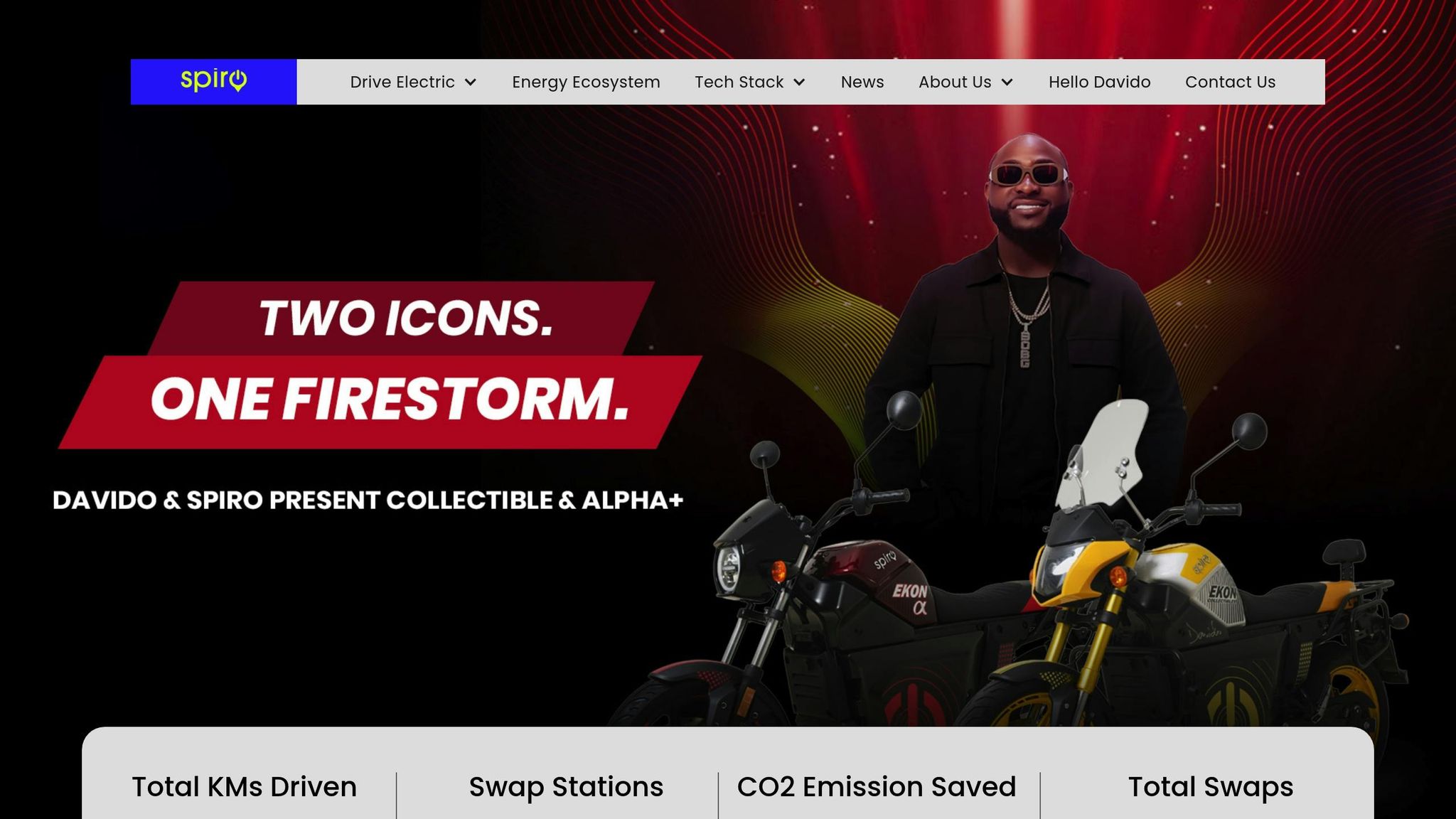Spiro has secured $63 million in funding to scale up local electric motorbike production in Kenya and expand into West Africa. This investment, supported by Société Générale and GuarantCo, will fund the deployment of 15,700 electric motorbikes and establish 1,000+ battery swap stations in Benin and Togo. In Kenya, the focus is on building advanced assembly facilities, creating jobs, and offering training programs to equip workers with skills in electric vehicle technology.
The shift to electric motorbikes addresses Kenya’s growing urban pollution and reliance on imported fuel. By replacing gas-powered boda bodas, Spiro’s electric alternatives reduce emissions, noise pollution, and operational costs for riders. Key challenges include improving the power grid, regulatory clarity, and public awareness, but the potential for growth is immense. Spiro’s efforts are positioning Kenya as a leader in clean transportation within East Africa and beyond.
Funding Details and Company Plans
Main Investors and Allocation of Funds
Spiro has raised $63 million through debt financing, backed by Société Générale and secured by GuarantCo. This financing approach allowed Spiro to retain control of the company while gaining the capital needed for growth. The funds are now fueling Spiro’s strategic plans for expansion.
Spiro‘s Future Plans and Focus Areas

With this financial boost, Spiro is gearing up to expand into West African markets. The funding will support the deployment of 15,700 electric motorbikes and the construction of over 1,000 battery swap stations in Benin and Togo.
Increasing Local Electric Motorbike Production
Factory Growth and Production Numbers
Spiro has secured $63 million in funding to ramp up Kenya’s electric motorbike production. With this investment, the company is upgrading local assembly operations by introducing state-of-the-art facilities equipped with advanced production lines. These facilities will handle essential processes like battery integration and quality testing, ensuring the bikes meet international standards. This initiative aims to establish Kenya as a key manufacturing hub for electric two-wheelers in East Africa while also driving workforce development in the region.
Jobs and Training Benefits for Kenya
This expansion will open up opportunities across various roles, including assembly, quality control, logistics, maintenance, and supervision. To complement job creation, Spiro is teaming up with local technical institutes and vocational schools to offer training programs. These programs will focus on skills like battery technology, electric motor systems, and digital diagnostics. The company is also committed to encouraging women to take up technical roles and supporting local suppliers to help build a stronger electric vehicle ecosystem in Kenya.
Effects on Clean Transportation in Kenya
How Electric Motorbikes Help the Environment
Electric motorbikes are transforming urban transportation in Kenya by cutting down on harmful emissions. Spiro’s electric motorbikes, for example, produce no tailpipe emissions and operate quietly, which helps improve air quality and reduce noise pollution in crowded cities.
These benefits go hand-in-hand with Kenya’s growing renewable energy sector, which includes solar and wind power projects. As the country continues to expand its clean energy capacity, the environmental advantages of adopting electric vehicles are set to increase. Replacing traditional motorbikes with electric ones not only cleans up the air but also reduces the reliance on imported fossil fuels. On top of that, riders save on operational costs, creating a win-win for both the environment and the economy.
Lower Costs and Better Access for Riders
Spiro has addressed one of the biggest challenges in adopting electric vehicles: charging infrastructure. Their battery-swapping system allows riders to quickly exchange used batteries for fully charged ones at specific stations. This eliminates the need for time-consuming charging or expensive home setups, making the transition to electric vehicles much more practical.
Additionally, Spiro offers flexible financing options, making it easier for boda boda operators to access electric motorbikes without a large upfront cost. These financial solutions make the switch from gas-powered to electric motorbikes more accessible, especially for riders who rely on their bikes for daily income.
Electric vs. Gas-Powered Motorbikes Comparison
While electric motorbikes often have a higher upfront cost compared to gas-powered models, they excel in long-term savings. Riders benefit from lower energy and maintenance expenses, along with the added perks of zero emissions and quieter operation. Gas-powered motorbikes may still offer a longer range per tank, but for commercial riders, the environmental and financial advantages of electric motorbikes often outweigh this drawback.
For those who use their bikes every day, the cumulative savings from lower operating costs make the switch to electric not only eco-friendly but also economically practical.
Problems and Growth Potential for Electric Mobility in Kenya
Main Problems: Power Grid, Regulations, and Public Awareness
Kenya’s shift toward electric vehicles isn’t without hurdles. While the country has made strides in renewable energy, the power grid – especially in rural areas – remains a weak link. Frequent outages and voltage fluctuations can disrupt charging stations and battery-swapping operations. For motorbike operators who rely on daily income, such interruptions could be devastating. These grid issues also pose challenges for companies trying to scale up their manufacturing and charging networks.
On top of that, Kenya’s regulatory framework is still catching up. Clear policies on safety standards, import duties, and operational guidelines are lacking, leaving businesses and investors uncertain about the future. Public awareness is another stumbling block. Many people remain skeptical about electric vehicles, questioning battery performance, maintenance requirements, and overall reliability. To make matters worse, there’s a shortage of technicians trained to work on EVs, as most mechanics are still focused on servicing internal combustion engines.
However, tackling these issues could unlock major opportunities for growth in the sector.
Growth Opportunities and Market Expansion
Despite the challenges, Kenya’s electric mobility sector holds immense promise. Addressing the power grid and regulatory gaps could accelerate the country’s transition to sustainable transportation. The government’s growing interest in clean energy solutions might pave the way for public-private partnerships, which could help improve infrastructure and establish clearer regulations. As a regional economic leader, Kenya is also well-positioned to expand its electric vehicle market into neighboring countries like Uganda, Tanzania, and Rwanda – markets that face similar hurdles and could benefit from locally produced electric motorbikes.
Kenya’s thriving tech ecosystem adds another layer of potential. Local developers could design apps for tracking battery health, optimizing routes, and scheduling maintenance, making electric vehicles more user-friendly and efficient. Plus, the widespread use of mobile payment platforms like M-Pesa offers a unique advantage. These platforms could support flexible financing options for bike purchases, battery swaps, and charging services, making electric mobility more accessible to small business owners and daily operators.
The motorbike taxi sector, a cornerstone of Kenya’s transport system, offers a natural entry point for electric bikes. With proper training programs and partnerships with rider associations, this sector could help close the skills gap and boost consumer confidence in EV technology. Kenya’s growing capacity in renewable energy – fueled by solar and wind projects – further strengthens the case for electric mobility. Combine that with a tech-savvy, youthful population eager to embrace innovation, and Kenya is well-positioned to lead the way in electric motorbike adoption, both at home and across the region.
sbb-itb-e5ed0ed
What This Means for Africa’s Electric Vehicle Sector
Spiro as an Example for African EV Manufacturing
Spiro’s ability to secure $63 million in funding demonstrates the real potential of local electric vehicle (EV) manufacturing in Africa. By choosing to set up production facilities within its target markets instead of importing fully assembled vehicles, Spiro is creating a growth model that aligns with local needs and resources. This strategy not only reduces reliance on imports but also builds confidence among investors who see the promise of locally driven EV production.
Spiro’s focus is on designing affordable vehicles tailored to local conditions, particularly for the motorbike taxi sector. This approach prioritizes the needs of everyday commuters, showing that success doesn’t have to stem from competing in high-end global markets. Instead, it can come from addressing practical, day-to-day transportation challenges. Such a strategy also lays the groundwork for regional collaboration and skills sharing, which could further strengthen the industry.
These developments are boosting Kenya’s supply chain and contributing to the creation of an ecosystem that supports industrial connections across the region. By focusing on local production, Spiro is helping to establish the foundation for a thriving EV manufacturing sector in Africa.
Skills Sharing and Industrial Development Opportunities
Spiro’s expansion is doing more than just producing electric vehicles – it’s also creating opportunities for skills development and knowledge transfer. Through investments in local training programs, the company is building a workforce skilled in EV technology, from technical maintenance to manufacturing processes. These efforts are not only benefiting Spiro but also equipping the region with expertise that could power the broader EV industry.
The skills being developed in Kenya’s electric motorbike sector have potential applications in other areas of the EV industry, such as battery management, motor assembly, and charging infrastructure. As these capabilities grow, they could encourage regional collaboration and open doors for technology sharing across borders.
Additionally, the growth of local EV production is likely to spur the development of supporting industries, including those specializing in plastics, electronics, and metalworking. As local suppliers scale up, production costs could decrease, making EVs more affordable for consumers and further driving adoption.
Spiro’s efforts illustrate how local manufacturing can spark industrial development and innovation in sustainable transportation. By focusing on clean mobility solutions, Kenya is positioning itself as a leader in advancing environmentally friendly transportation across the region.
Africa’s biggest electric bike Assembly Line (Spiro Kenya)
Conclusion: Moving Kenya’s EV Future Forward
Spiro’s $63 million funding milestone marks a turning point for Kenya’s electric vehicle (EV) industry. By prioritizing local production, the company is helping build a transportation system that supports everyday Kenyans while also being kinder to the environment.
This funding is already making a difference. It’s improving access to electric transport, creating long-term job opportunities, and fostering technical skills that could benefit Kenya for years to come. The shift from gas-powered to electric motorbikes is also paving the way for reduced urban pollution and greater energy independence.
However, challenges remain. To unlock Kenya’s full EV potential, private companies, government agencies, and international investors must work together. Spiro’s success with local manufacturing shows that African markets can sustain homegrown EV production, but scaling this success will require addressing gaps in infrastructure across the country.
Spiro’s expansion and investment in local talent are laying the groundwork for Kenya to emerge as a regional leader in electric mobility. As more companies embrace local production and invest in workforce development, Kenya is positioning itself at the forefront of Africa’s clean transportation movement. Moving forward, sustained innovation, strategic partnerships, and efforts to make EVs more accessible will be essential. With every locally produced electric motorbike, Kenya is accelerating toward a cleaner, more sustainable future.
FAQs
How will Spiro’s $63 million investment in electric motorbike production benefit jobs and skills development in Kenya?
Spiro’s $63 million investment is poised to bring a wave of job opportunities and skill-building initiatives to Kenya. With plans to ramp up local production of electric motorbikes, the company aims to create jobs across manufacturing, maintenance, and repair sectors – opening doors especially for young people and women.
To support this, specialized training programs are being rolled out to prepare workers for careers in electric vehicle (EV) technology. These efforts not only align with Kenya’s shift toward greener transportation but also uplift local communities by reducing unemployment and nurturing a skilled workforce for the expanding EV industry.
What obstacles does Spiro face in expanding electric motorbike infrastructure in Kenya and West Africa, and how are they overcoming them?
Spiro is grappling with several obstacles in expanding electric motorbike infrastructure. Key issues include a shortage of charging and battery-swapping stations, steep costs, and unreliable electricity access. On top of that, regulatory barriers and local social dynamics add extra layers of complexity, particularly in Kenya and across West Africa.
To address these hurdles, Spiro is rolling out battery-swapping programs and building scalable charging networks tailored to handle the region’s climate challenges. They’re also teaming up with policymakers and private-sector players to create more affordable and accessible solutions. The goal? To make electric motorbikes a viable and practical choice for daily transportation in the area.
How does Spiro’s battery swapping system make electric motorbikes more practical and accessible for riders in Kenya?
Spiro’s battery swapping system transforms the way electric motorbikes are used, making them much more convenient and user-friendly. Instead of waiting around for a battery to charge, riders can simply swap out a depleted battery for a fully charged one in just a few minutes. This quick process keeps downtime to a minimum and eliminates the hassle of long charging sessions.
By tackling issues like range anxiety and the lack of widespread charging stations, this system makes electric motorbikes a practical choice for everyday commuting and even commercial operations. It also aligns with Kenya’s efforts to promote cleaner, more sustainable transportation options.
Related Blog Posts
- Kenya opens East Africa’s first EV battery lab in Nairobi
- MojaEV launches NETA V electric car in Kenya
- Bolt and M-KOPA introduce electric motorbikes for riders
- BasiGo to build 16 EV bus charging stations in Nairobi




